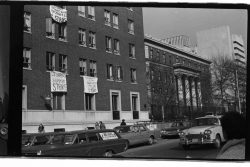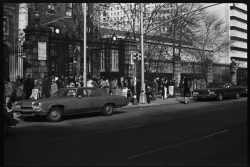
Students protesting outside Barnard in 1974
What’s the deal with Barnard’s contingent faculty? What is contingent faculty? What was the strike threat all about? Bwog staffer Sarah Dahl got a chance to hear from one of the union organizers last night, and is here to write about it. The following reflects her own opinions.
“The College has consistently maneuvered legal delays and stalled negotiations to prevent the workers from achieving a decent contract…we are striking because we want the rights that are basic to the dignity of working people.”
This language comes from a 1974 pamphlet distributed by Barnard’s clerical workers. Secretaries and administrative assistants unionized, went on strike, and eventually gained a livable contract through their relentlessness.
The benefits they asked for, and the dismissive attitude of the college don’t sound all that different from today’s negotiations between Barnard’s union of adjunct faculty and the administration.
The contingent faculty union BCF UAW-2110 had been asking for new benefits for over a year, with little budge from the administration–until now, when the union prepared to go on strike. Late last night, after days of intense negotiation, they finalized a new contract.
Before that contract was decided last night, I got to attend a Student Worker Solidarity (SWS)-organized event in Barnard’s 616 lounge, where I learned about the history of worker’s rights at Barnard, as well as some of the finer points of today’s negotiations, from professor/union organizer Sonam Singh. Singh has been a contingent faculty member in the English department at Barnard for five years, and he teaches first year English. Many contingent faculty teach core Barnard classes like these, as well as courses in the college’s renowned dance program, architecture department, and others. Almost two-thirds of Barnard’s faculty are non-tenure-track. The majority of them are women.
Contingent faculty unionized in early fall of 2015, and the college took four months to even begin negotiating. During that time, they hired well-known union-busting law firm Jackson Lewis.
Without a new contract, non-tenure track professors have no job security, work for extremely low salaries, and lack decent benefits, like healthcare and maternity leave. Many of these employees teach without a contract, unsure if they’ll be rehired from one semester to the next.
There were two dozen or so of us in the lounge. Originally, the event was planned by Res Life RAs, but organizers were told by Dean Hinkson (three days beforehand) that the topic was too sensitive, and the event had to be postponed indefinitely. A few weeks ago, a different group of RAs attempted to plan a similar event, and were also shut down by Dean Hinkson.
Luckily, the show went on; just not sanctioned by the college. But this action implies a deeper issue–the administration’s lack of transparency regarding BCF UAW negotiations. We’ve received Provost Bell’s and President Spar’s emails over the past few months, but they’re opaque, equivocal, and biased. The specifics of the union’s bargaining, its desires, and the stubbornness of the college are unclear, because our administrators haven’t told us what contingent faculty are asking for, or how little the college is willing to give.
In the past few months, I’ve learned more. When a group of students stood in protest at a DSpar event in November, and asked about healthcare benefits for adjunct professors, I was frustrated and shocked by our president’s non-response. I read the flyers passed out at the talk by union and SWS members, and then wrote about the event for Bwog.
DSpar’s failure to address student concerns then doesn’t seem all that different from another incident, in 1974, involving former Barnard president Martha Petersen. Petersen was hosting a tea for students, several of whom wished to discuss union pleas and the status of negotiations. According to Spec, Petersen declared “we’re not going to spoil this party,” and then walked out.
The gravity of the college’s behavior–then and now–is heavy.
In 1974, Gloria Steinem visited campus in support of strikers. This Sunday, Steinem visited again, as a panelist for an event on activism. Sure enough, students in the audience brought up the current impending strike, and the activist panelists were happy to discuss it, exhorting students to support our contingent faculty.
In 1996, employees–mainly women of color–organized a strike that lasted six months. In the end it was fruitful–the union got everything it asked for. Students flung banners from dorm windows, respected the picket line, and protested at their graduation. Several students’ diplomas were withheld.
It shouldn’t take this kind of action to make administrators realize the validity of our contingent faculty’s needs, but it did. Luckily, today’s threat of strike induced the college to finally negotiate more fairly, and now contingent faculty have secured the promise of a decent contract.
Professor Singh said it was a real shame that the college only got serious about negotiation with a strike imminent. Suddenly, money appeared that the administration said it didn’t have before. COO and interim President Rob Goldberg bought organizers pizza last night.
I agree that it’s a real shame. Before last night’s contract deal, the irony inherent in the college’s unwillingness to provide adequate wages and benefits to women was mind-blowing. We’re taught, at Barnard, that we can do or become whatever we want. We’re ‘elite,’ we’re special, we’re invincible. Our brand is female empowerment. Until now, though, if our dreams involved venturing into the precarious world of academia, though, they didn’t look livable–especially at our alma mater.
I’m delighted, and hopeful, at the prospect of the new contract. President Spar noted in her email last night that more details would come today. I look forward to reading them, and to resting assured that our contingent faculty will finally get the salaries, benefits, and respect they deserve.
- 1974 union strike


 1 Comments
1 Comments


1 Comment
@Anonymous Get ready for your tuition to zoom.